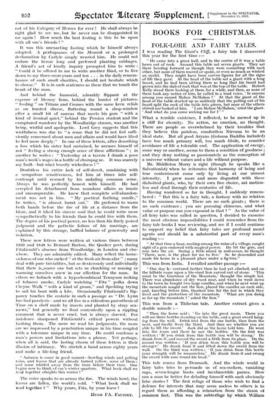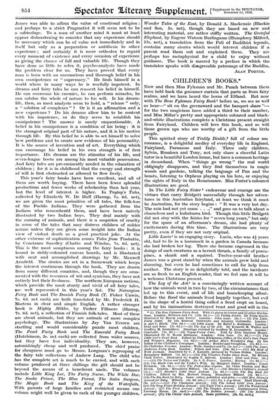BOOKS FOR CHRISTMAS.
FOLK-LORE AND FAIRY TALES.
I WAS reading The Giant's Cliff, a fairy tale I discovered this year for the first time :- " He came into a great hall, and in the centre of it was a table hewn out of rock. Around this table sat seven giants. They sat there bending forward as though they were consulting with each other, but none of them moved or spoke, or even so much as winked an eyelid. They might have been carven figures for all the signs of life they gave. At the head of the table sat a giant with a long beard, and he had been sitting there so long that his beard had grown into the slab of rock that was at the top of the table. Robert Kelly stood there looking at them for a while, and then, as none of them took any notice of him, he called in a loud voice, ' Is anyone among you named Mahon McMahon ? ' At that the giant at the head of the table started up so suddenly that the pulling out of his beard split the rock of the table into pieces, but none of the others stirred nor looked at him. I am Mahon McMahon,' cried the giant. And what do you come seeking me for?'" What a terrible existence, I reflected, to be mewed up in a cliff for eternity. No action, no emotion, no thought. There are people so overwhelmed by their troubles that they believe this painless, comfortless Nirvana to be an ideal state. But all good Aryans (Gotama Buddha included) have too much primary will, too much libido, to consider avoidance of life a tolerable end. The application of energy, some way or another, seems to them a condition of goodness ; and they deny nothing so passionately as the conception of a universe without values and a life without purpose.
Mr. Middleton Murry is right (though he speaks like a Salvationist) when he reiterates that harmony of being and true contentment come only by living at our utmost intensity. I grew more and more disgusted with these diabolical giants, who, by their own free choice, sat motion- less and dead through their centuries of life.
Having wandered so far in thought, I suddenly remem- bered : " But this is a fairy tale, a fantasy with no relation to the common world. There are no such giants ; there is no such existence ; you are pursuing chimeras, and what value or purpose can you expound in that ? " As the value of all fairy tales was called in question, I decided to examine the most obvious impossibilities I could remember from the fairy tale books I was reviewing, and see if I could continue to support my belief that fairy tales are profound moral agents and should be a substantial part of every man's reading :—
" At that time a boar, rooting among the ruins of a village, caught sight of a gem endowed with magical power. He bit the gem, and rose into the air. Seeing a little island in mid-ocean, he thought There, now, is the place for me to live.' So he descended and made his home in a pleasant place under a fig-tree."
This was from India. I recalled another passage :- " One day In ventured farther than he had yet climbed, and on • the hillside came upon a life-sized lion carved out of stone. This must be the Guardian of the Mountain,' thought the simple lad. There was abundance of dry wood near, and when he went down to the town he bought two large candles, and when he next went up the mountain sought out the lion, placed the candles on each side, and, kneeling before him, thanked him for the but in which they lived and the protection of the mountain. What are you doing so far up the mountain 7 ' asked the lion."
This was from a Thibetan tale. Another extract gives a double miracle :-
"Then the horse said : Go into the great room. There you will see three bottles standing on the table, and a great sword hang- ing from the wall. Drink first from the one bottle, then from the next, and finally from the third. And then see whether you are able to lift the sword.' Jack did as the horse told him. He went into the room and there he saw the bottles. On the first was written : If you drink from this bottle you will be strong.' He drank from it, and moved the sword a little from its place. On the second was written : If you drink from this bottle you will be stronger.' He drank flora it and lifted down the sword from the wall. On the third was written : If you drink from this bottle your strength will be measureless.' He drank from it and swung the sword with ease round his head."
This tale comes from Denmark. And the whole world in fairy tales tries to persuade us of sea-suckers, vanishing caps, seven-league boots and inexhaustible purses. How can a man be better for deluding himself with such obviously false stories ? The first refuge of those who wish to find a defence for interests that may seem useless to others is to regard them as affording a. relaxation from the strain of common fact. This was the subterfuge by which William James was able to affirm the value of emotional religion : and perhaps to a strict Pragmatist it will seem not to be a subterfuge. To s. man of another mind it must at least appear disheartening to consider that any experience should be necessary which can be of value not immediately and in itself but only as a preparation or antithesis to other experience ; and certainly it is more orthodox to regard every moment of existence and every occasion of experience as giving the chance of full and valuable life. Though they have done so little to solve it, psycho-analysts have made the problem clear for us. They have proved that every man is born with an unconscious and thorough belief in his own omnipotence or " supremacy." He finds himself in a world where in many ways he is woefully impotent. In dreams and fairy tales he can reassert his belief in himself. He can overcome his enemies, he can perform miracles, he can subdue the whole of nature to his will. Is his dream- life, then, as most analysts seem to hold, a " release " only, a " solution of complexes " ? Or is it an affirmation and a new experience ? Do his dreams allow him to be content with his impotence, or do they serve to establish his omnipotence ? The answer is surely unquestionable. A belief in his omnipotence is a condition of his being : it is the strongest original part of his nature, and it is his motive through life. By this belief he is able to set himself to solve *hew problems and to create new evidence of his personality. It is the source of invention and of art. Everything which can encourage his belief in his own strength is of first importance. His dreams are the stimulus of his life, and seven-league boots are among his most valuable possessions. And fairy tales are pm-eminently needed in the education of children ; for it is in childhood that the energy and strength of will is first obstructed or allowed to flow freely.
• This year's fairy books have been excellent, and all of them are worth buying. There have been fewer splendid productions and fewer works of scholarship than last year, but the level of interest is higher. In Taytay's Tales, collected by Elizabeth W. Dc Huff (Harrap, 7s. 6d. net), we are given the most primitive of all tales, the folk-lore of the Pueblo Indians. They were gathered from the Indians who rememberOd them, and have been naively illustrated by two Indian boys. They deal mainly with the cunning of animals, and there is a suspicion of cruelty in some of the talcs that may distress children of milder nature unless they are given some insight into the Indian view of violent death as a good practical joke. At the other extreme of sophistication comes Tales from Timbuktu, by Constance Smedley (Chatto and Windus, 7s. 6d. net). This is the most sumptuous among the fairy books : it is bound in richly-coloured canvas boards, and is illustrated with neat and accomplished drawings by Mr. Maxwell Arrnficld. The stories are set in a framework which keeps the interest continuous through the book. They are drawn from many different countries, and, though they are orna- mented with the resources of wit and cynicism, they leave not entirely lost their freshness. The northern European nations, which provide the most sturdy and vivid of all fairy tales, are well represented in this year's list. The Norwegian Fairy Book and The Danish Fairy Book (T. Fisher Unwin, 7s. 6d. net each) are both translated by Mr. Frederick H. Martens in clear and simple English. A rather stranger book is Mighty Mikko, by Parker Fillmore (Harrap, 7s. 6d. net), a collection of Finnish folk-tales. Most of these are about animals, but they are animals of more complex psychology. The illuttrations by Jay Van Everen are startling and would considerably puzzle most children. The Pearl Fairy Book and The Emerald Fairy Book (Hutchinson, 5s. net each) are collected from wider sources, but they have less individuality. They are, however, astonishingly cheap and well produced. The chief praise for cheapness must go to Messrs. Longman's regrouping of the fairy tale collections of Andrew Lang. The child who has the complete set is much to be envied, and with each volume produced at three shillings the gift should not be beyond the means of a beneficent uncle. The volumes include Little King Loc, The Fairy Nurse, The White Doe, The Snake Prince, The Mee Parrot," The- Satin Surgeon, The Magic Book and The King of the Waterfalls.. With parents of large families and restricted means one volume might well be given to each of the younger children. Wonder Tales of the East, by Donald A. Mackenzie (Blackie and Son, 5s. net), though they are based on new and interesting material, are rather stiffly written. The Grateful Elephant, by Eugene Watson Burlingame (Humphrey Milford, 15s. net), a translation from the Pali of Buddhist legends, contains many stories which would interest children if a parent read them out and explained them. They are perhaps too metaphysical for a child to enjoy without guidance. The book is marred by a preface in which the translator speaks with disagreeable patronage of the Buddha.
ALAN Pourun.



















































 Previous page
Previous page